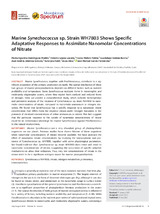Mostrar el registro sencillo del ítem
Marine Synechococcus sp. Strain WH7803 Shows Specific Adaptative Responses to Assimilate Nanomolar Concentrations of Nitrate
| dc.contributor.author | Domínguez-Martín, María A. | |
| dc.contributor.author | López-Lozano, Antonio | |
| dc.contributor.author | Melero-Rubio, Yesica | |
| dc.contributor.author | Gómez-Baena, Guadalupe | |
| dc.contributor.author | Jiménez-Estrada, Juan Andrés | |
| dc.contributor.author | Kukil, Kateryna | |
| dc.contributor.author | Díez, Jesús | |
| dc.contributor.author | García-Fernández, José Manuel | |
| dc.date.accessioned | 2024-02-09T09:31:13Z | |
| dc.date.available | 2024-02-09T09:31:13Z | |
| dc.date.issued | 2022 | |
| dc.identifier.uri | http://hdl.handle.net/10396/27350 | |
| dc.description | Datos de investigación disponibles en: https://www.ncbi.nlm.nih.gov/bioproject/PRJNA830281 | |
| dc.description.abstract | Marine Synechococcus, together with Prochlorococcus, contribute to a significant proportion of the primary production on Earth. The spatial distribution of these two groups of marine picocyanobacteria depends on different factors such as nutrient availability and temperature. Some Synechococcus ecotypes thrive in mesotrophic and moderately oligotrophic waters, where they exploit both oxidized and reduced forms of nitrogen. Here, we present a comprehensive study, which includes transcriptomic and proteomic analyses of the response of Synechococcus sp. strain WH7803 to nanomolar concentrations of nitrate, compared to micromolar ammonium or nitrogen starvation. We found that Synechococcus has a specific response to a nanomolar nitrate concentration that differs from the response shown under nitrogen starvation or the presence of standard concentrations of either ammonium or nitrate. This fact suggests that the particular response to the uptake of nanomolar concentrations of nitrate could be an evolutionary advantage for marine Synechococcus against Prochlorococcus in the natural environment. | es_ES |
| dc.format.mimetype | application/pdf | es_ES |
| dc.language.iso | eng | es_ES |
| dc.publisher | American Society for Microbiology | es_ES |
| dc.rights | https://creativecommons.org/licenses/by-nc-nd/4.0/ | es_ES |
| dc.source | Domínguez‐Martín, M. A., López‐Lozano, A., Melero-Rubio, Y., Gómez‐Baena, G., Jiménez-Estrada, J. A., Kukil, K., Dı́ez, J. & García-Fernández, J. M. (2022). Marine Synechococcus sp. Strain WH7803 Shows Specific Adaptative Responses to Assimilate Nanomolar Concentrations of Nitrate. Microbiology Spectrum, 10(4). https://doi.org/10.1128/spectrum.00187-22 | es_ES |
| dc.subject | Synechococcus WH7803 | es_ES |
| dc.subject | Nitrate | es_ES |
| dc.subject | Nitrogen metabolism | es_ES |
| dc.subject | Proteomics | es_ES |
| dc.subject | Transcriptomics | es_ES |
| dc.title | Marine Synechococcus sp. Strain WH7803 Shows Specific Adaptative Responses to Assimilate Nanomolar Concentrations of Nitrate | es_ES |
| dc.type | info:eu-repo/semantics/article | es_ES |
| dc.relation.publisherversion | https://doi.org/10.1128/spectrum.00187-22 | es_ES |
| dc.relation.projectID | Gobierno de España. BFU2016-76227-P | es_ES |
| dc.relation.projectID | Junta de Andalucía. P12-BIO-2141 | es_ES |
| dc.relation.projectID | Junta de Andalucía. P20_00052 | es_ES |
| dc.relation.projectID | Junta de Andalucía. EJI-17-BIO-123 | es_ES |
| dc.rights.accessRights | info:eu-repo/semantics/openAccess | es_ES |

